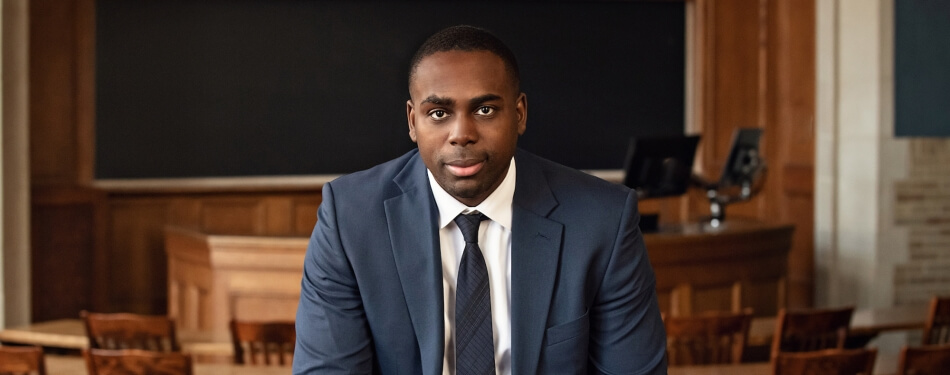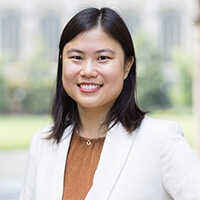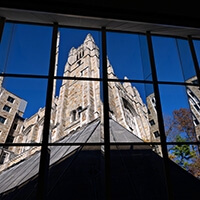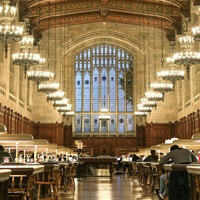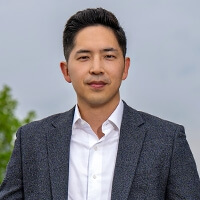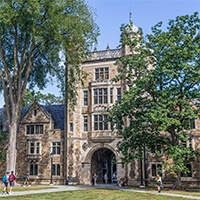Michigan Law Professor Daniel Fryer, ’18, has been appointed to an advisory board developing proposals for providing reparations to Black people in Washtenaw County.
Washtenaw County created its Advisory Council on Reparations last year “to outline the specific ways that County policies and practices have historically and continually harmed the lives of Black people and to develop recommendations for the Board of Commissioners in the form of a Washtenaw Reparations Plan,” according to the council website. “The plan will include recommendations around specific actions to address redress in the sectors of homeownership and access to other quality affordable housing; increasing business ownership and career opportunities; strategies to grow financial equity and generational wealth; closing the gaps in health care, education, employment and pay; neighborhood safety; and fairness within criminal justice.”
Scholarly research and community lawyering
Fryer joins another Michigan Law professor serving on the panel, Michael Steinberg, who was appointed last year. Steinberg also served on an earlier exploratory committee that led to the creation of the advisory council.
Fryer noted that a handful of jurisdictions around the country—including the State of California and Evanston, Illinois—have established similar panels to consider whether reparations are appropriate and, if so, what form they might take.
“I’ve seen what’s going on in various places across the country, and it’s also an issue that I write about,” Fryer said. “I’m constantly looking at not just what scholars are saying about reparations and reparative justice but also at what’s actually happening on the ground.” So when he heard about the Washtenaw County effort, he was quick to volunteer.
“I‘m hoping that we are able to provide a recommendation to the government that essentially shows the way that past injustices affect people today and gives concrete steps to fix things. The way I think about reparations is that it’s about repair. In order to repair something, you need to know what’s broken. So I imagine part of my task is going to be working with people from various fields and diagnosing the problem first,” Fryer said.
Steinberg’s involvement with the reparations movement stems from his work in the Law School’s Civil Rights Litigation Initiative to raise awareness about the fact that tens of thousands of homes in Washtenaw County still have racist covenants. These covenants, which allow only white people to live in dozens of neighborhoods (unless they were domestic servants), have deprived people of color of wealth and opportunity for generations, he said.
“Even though the covenants are no longer enforceable, there is certainly value in educating the public that housing policy—even in this relatively liberal community—was built on white supremacy. Yet simply doing education seems insufficient. I want to help develop policies and programs intended to address the untold damage caused by centuries of racism and repression in Washtenaw County and throughout the country.”
Exploring different models for reparations
The resolution creating the advisory council identifies a number of possible focus areas, including a 10-year gap in life expectancy between Black and white county residents, higher infant mortality in the Black community, lower wages for Black workers, and unequal treatment by the law-enforcement system.
“I don’t think there’s a one-size-fits-all model” for reparations, Fryer said. “I think there are broad principles that we could all agree to, but I think each jurisdiction needs to be aware of the particular problems that their community is facing and work toward making changes based on those problems.”
This academic year, Fryer also is working on issues relating to reparations as part of a Laurance S. Rockefeller Fellowship at the Princeton University Center for Human Values. It is also the subject of his doctoral dissertation in philosophy from the University of Pennsylvania. For the first time this year, the fellowship has a theme—reckoning with race.
“It’s exciting to be around a cohort of people who are thinking about how we reckon with race in our society. It’s been extremely beneficial for me to be here,” Fryer said. “I’m working on a set of articles that are derived from my dissertation work, ‘Repairing Reparative Justice,’ defending and articulating a relational conception of reparations and trying to explain why philosophers and political theorists should pay more attention to the wrongdoing of the past.”
Fryer is an assistant professor of law. Before joining the Michigan Law faculty, he served as an assistant district attorney in Philadelphia, where he handled cases at the pretrial, trial, and posttrial levels. He also clerked for a Michigan Law alumnus, the Hon. Roger L. Gregory, ’78, on the US Court of Appeals for the Fourth Circuit.

